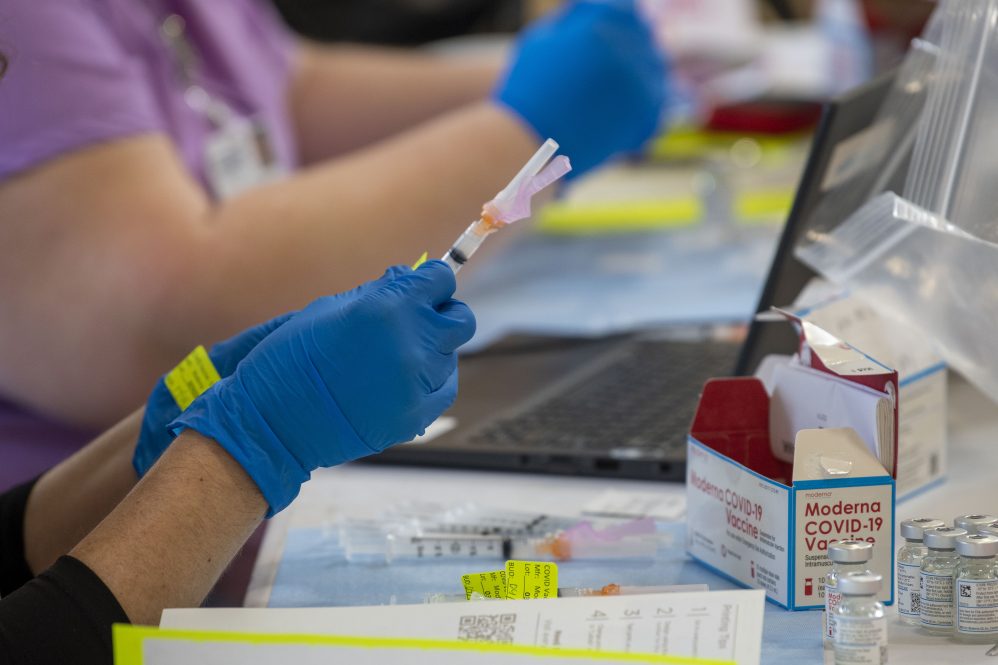Social media has become a powerful force for spreading information, and unfortunately, misinformation. Anti-vaccine groups have established a strong presence on social media sites like Facebook. A pair of UConn researchers recently found these groups quickly seized on the COVID-19 pandemic as their next avenue of mongering fears over a vaccine before it even existed.
UConn researchers Seth Kalichman, professor of psychology, and Lisa Eaton, professor of human development and family sciences, recently published their findings of a study of anti-vaccine Facebook groups’ communications during the early days of the COVID-19 pandemic in the Journal of Public Health.
Kalichman and Eaton collaborated with University of Delaware colleagues Natalie Brousseau and Valerie Earnshaw, who earned her Ph.D. at UConn.
The researchers found anti-vaccine groups identified COVID-19 as a significant public health threat that would likely require a vaccine as early as February 2020. The study covered the period from February to May 2020.
“When COVID-19 emerged my colleagues and I were interested in understanding how the anti-vaccine groups might respond,” Kalichman says. “We were surprised to see they started as early as they did.”
This work drew upon Eaton and Kalichman’s earlier research on anti-vaccine groups online. From 2013-2015, they conducted a study funded by the Bill and Melinda Gates Foundation. Many of the same trends appeared now.
The researchers selected four groups to focus on for this study: Dr. Tenpenny on Vaccines, the National Vaccine Information Center (NVIC), the Vaccination Information Network (VINE), and the Vaccine Machine. The first three of these groups were all popular during their initial study.
These groups, which have tens of thousands of followers, are highly active on Facebook, a widely used social media platform.
Kalichman says the messaging and tactics these groups used for COVID-19 are largely the same as what they use for other diseases.
“The framework for them is already in place, it doesn’t matter what disease, what vaccine,” Kalichman says. “It’s a worldview.”
The goal of this work is not to convince fervent disbelievers in vaccines that they are wrong, but rather to prevent other people who may be ambivalent about getting vaccinated from getting sucked into this swirl of misinformation.
These anti-vaccine groups often capitalize on appeals to emotion and personal anecdotes, strategies which have proven effective.
“People can really gravitate to anecdotal accounts, as opposed to Dr. Fauci lecturing people to get vaccinated,” Kalichman says.
The aim of this work is to help inform public health officials about how anti-vaccine groups are communicating and appealing to the public so officials can better combat misinformation earlier in the next public health crisis.
“By better understanding how anti-vaccine groups formulate their initial communications and start to sow seeds of doubt in vaccines long before there even is a vaccine can help inform public health officials in how they communicate and how they might head off some of the anti-vaccine rhetoric,” Kalichman says.
Eaton and Kalichman recommend public health agencies should establish a robust presence on all social media platforms. Messaging that is credible, clear, and appealing will be more effective than dense scientific language or having a limited to nonexistent social media presence.
While this study did not examine the impact of anti-COVID-19 vaccine posts on people’s hesitancy to receive one of the vaccines once they were approved, the researchers work under the reasonable assumption that exposure to these posts has a negative impact.
The researchers are now interested in analyzing email newsletters from the far-right news outlet The Epoch Times and Dr. Tenpenny.
Other potential avenues of interest in this field include looking at these groups’ posting patterns once vaccines were approved, or how they operate on other social media platforms like Twitter and characterizing the kinds of language the groups and commentors use.
This work was supported by the Office of the Vice President for Research.
Kalichman holds a Ph.D. from the University of South Carolina. He is a researcher in the UConn Institute for Collaboration on Health, Intervention, and Policy (InCHIP). His research interests include health disparities and HIV-AIDS behavior research.
Eaton holds a Ph.D. from the University of Connecticut and completed a post-doctoral fellowship at Yale University. She is a researcher in InCHIP. Her research interests include health disparities, stigma and its effects on marginalized populations, social determinants of disease, and human sexuality and positive well-being.



